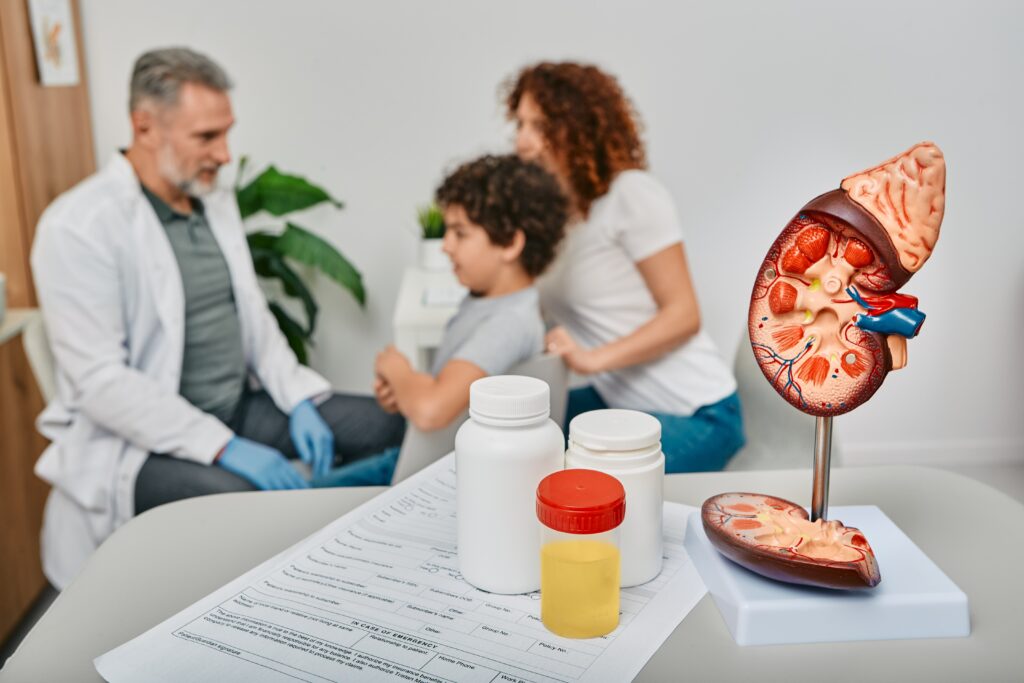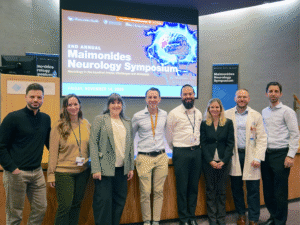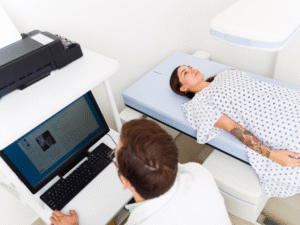When you think of kidney disease, children may not pop into your mind first. Pediatric kidney disease isn’t common as in adults, but it still impacts thousands of kids and teens in the United States every year.
Symptoms can be subtle, making diagnosis difficult. That’s why expert care from the Division of Pediatric Nephrology and Hypertension at Maimonides Children’s Hospital is critical. Our specialists are trained to recognize these complex conditions and deliver high-quality, comprehensive care to the youngest patients in Brooklyn and the surrounding area.
“Brooklyn is a large, diverse borough with more than 600,000 children, yet 25 years ago, a pediatric nephrology program didn’t exist in our local community. We needed a program to deliver the specialized kidney services that primary care providers couldn’t,” says Juan Kupferman, MD, MPH, Director of Pediatric Nephrology and Hypertension at Maimonides. “Overall, general pediatricians often are able to identify a child with a potential kidney problem but don’t have the specialized training in nephrology that may be needed to diagnose and/or manage these children. Our program significantly helps practitioners who need either support or confirmation of their suspicions. With our expertise, we can provide consultation and management for a full array of clinical diagnoses.”
Diagnosing and Treating a Wide Range of Conditions
Maimonides’ pediatric nephrology program offers a comprehensive suite of services, including advanced diagnostics, that can identify the most common—and complex—kidney conditions. “Our program is designed to be the first stop for children with kidney disease. We can diagnose and treat the vast majority of kidney pathologies,” Dr. Kupferman says. “Few children move on to needing dialysis or a transplant. We’re here to provide the primary care they need for kidney disease.”
Pediatric nephrologists collaborate closely with Maimonides radiologists, urologists, and pathologists to identify these conditions:
- Congenital renal and urinary tract abnormalities
- Fluid, electrolyte, and acid-base disorders
- Glomerulonephritis (kidney inflammation)
- Hematuria
- Hydronephrosis (urinary tract dilation that leads to urine collection inside the kidneys)
- Kidney injury
- Kidney involvement in diabetes
- Kidney stones
- Pediatric hypertension
- Proteinuria
- Urinary tract infections
The division works with radiologists who perform specialized renal ultrasounds to detect many of these conditions. This partnership is among the few advanced nephrology imaging collaborations in the Brooklyn area.
Maimonides recently expanded its diagnostic capabilities with genetic testing, Dr. Kupferman says.
“Existing research shows that genetics may be responsible for a significant number of kidney diseases in children. With this new, available genetic testing technology, we can make many new diagnoses,” he says. “With a simple cheek swab and lab analysis, we can see which inherited conditions are in a child’s genes.”
So far, Maimonides has used these tests effectively to detect genetic causes for multiple kidney diseases, including kidney tubular diseases, cystic kidney diseases, and inherited glomerular diseases, such as Alport syndrome.
Leading-Edge Treatment Options
Dr. Kupferman says the division is outfitted to treat primary kidney care concerns. Specialists offer a full range of treatments, including:
- Lifestyle modifications, including diet, weight management, and stress reduction
- Antihypertensive therapy
- Reduction of proteinuria
- Anti-inflammatory management
- Renal replacement therapy to remove excess fluids, waste products, and electrolytes from the bloodstream
In many conditions, targeted medications are the best treatment option, he says.
“We recommend anti-inflammatory agents for specific kidney diseases as well as antibiotic therapy for infections of the kidney and urinary tract. In addition, we can prescribe anti-hypertensive medications for our pediatric patients with hypertension.”
Providers obtain frequent blood tests to monitor electrolytes and kidney function to ensure the treatment is working and the patient’s condition is under control.
While Maimonides focuses on primary kidney concerns, they also assist patients who need more in-depth care. Dr. Kupferman says the division refers patients who require surgical intervention to Maimonides’ urology providers.
A Focus on Pediatric Hypertension
Treatment for pediatric hypertension is one of the factors that makes Maimonides’ pediatric nephrology program unique. Hypertension affects up to 5% of children and teens, potentially leading to long-term damage in multiple organs. When a secondary cause of hypertension is identified, it is often due to kidney-related issues. In children and adolescents, approximately 70 to 75% of cases of secondary hypertension are associated with kidney diseases or abnormalities, according to Dr. Kupferman. The kidneys play a crucial role in regulating blood pressure, so any impairment in kidney function can significantly impact blood pressure levels.
But many providers don’t know that pediatric hypertension is an existing problem, says Dr. Kupferman, who is also a trained pediatric hypertension expert.
To diagnose hypertension in children, Maimonides offers 24-hour ambulatory blood pressure monitoring. This state-of-the-art specialized service makes detection of hypertension more accurate.
“With a blood pressure cuff connected directly to a monitor, we get automatic blood pressure readings three times an hour over 24 hours,” he says. “This way, we capture blood pressure when the child is calm—not just when they’re nervous at the doctor’s office.”
Maimonides pediatric nephrologists and the child’s pediatrician use these findings to design treatment plans to control hypertension. In many cases, these plans focus on weight loss through diet, exercise, and sodium restriction.
Ultimately, Maimonides’ Pediatric Nephrology Division provides personalized care. Providers collaborate closely with the patient’s pediatrician to make sure they address the child’s individual needs.
“We take a comprehensive approach to ensure our patients feel seen and heard,” he says. “We are well positioned to deliver the care they need, even for the most complex nephrology cases.”
Learn more about pediatric nephrology and hypertension at Maimonides Children’s Hospital at https://maimo.org/treatments-care/childrens-hospital/pediatric-nephrology-and-hypertension/ or call 718-283-7500 to make an appointment or refer a patient.




